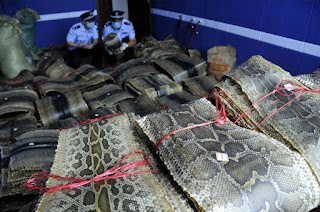Chinese authorities rolling them out one by one: python skins adorned with nature’s intricate patterning. The 68,000 skins were recovered this week as part of what may be the largest python skin smuggling case ever, according to the which cited Chinese media.
Customs agents in Haikou, a city in China’s southern province of Hainan, confiscated the skins, estimated to be worth $48 million. The smugglers claimed the items would be used in traditional Chinese musical instruments. According to the Los Angeles Times, Chinese media reported that at least one suspect said the company used fake customs declaration forms to import python skins and eggs. On January 29, authorities arrested 16 people across five Chinese cities in connection with the incident.
Pythons can be found across Asia, Australia, and Africa. They’re non-venomous constrictors that kill by wrapping themselves around their prey and suffocating it. Trade in live pythons and their parts is regulated by an international treaty to ensure their survival in the wild.
Even so, 500,000 skins are imported from Southeast Asia each year, primarily to Europe, according to a report by the International Trade Center, a subsidiary of the World Trade Organization. Python skins are in high demand in Europe and the U.S. for upscale shoes and handbags.
This appetite fuels a black market trade, which, judging by the size of this one seizure in Haikou, may be huge. “The report shows the problems of illegality persist in the trade of python skins and this can threaten species’ survival,

No comments:
Post a Comment